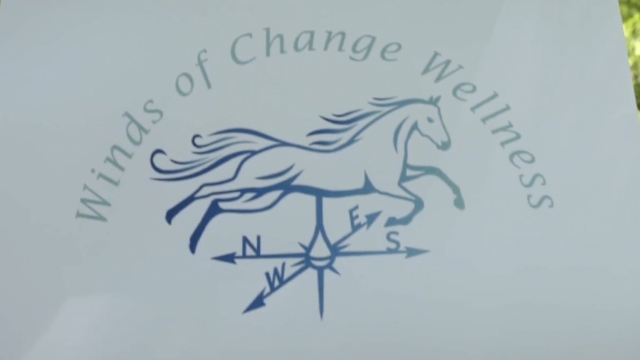On a Virginia horse farm, transformations are taking place. There are no riding lessons — here every creature is on equal footing.
"My horses are at liberty just like we are to engage and disengage. That's important," owner Darla Renshaw told Scripps News.
Renshaw, a licensed therapist, says horses by nature have the ability to strip away walls.
"You can't lie to a horse. If you're not showing up and being authentic, for instance, like if you're fearful, and you're trying to pretend like you're not, they already know it," she stated.
She uses the facility to treat people with PTSD and other forms of trauma through Equine Assisted Therapy (EAT) also known as Equine Assisted Psychotherapy (EAP).
"It's the energy exchange. It's their ability to sync their heart rate and their breath with ours. And it's as if you become just one living, breathing, moving organism with them," she explained.
The treatment involves leading and grooming the horses and gaining trust. It's also about learning to control and gauge emotions.
To learn more, Scripps News traveled to New York to visit with the director of the first university-led equine therapy study.
"Horses are very perceptive animals. They can smell and feel stress and fear and anger very quickly and very precisely, and it affects their behavior," explained Yuval Neria, director of the Columbia University Military Family Wellness Center.
SEE MORE: Dogs are helping comfort veterans diagnosed with PTSD
Neria runs the Man 'O War Project at Columbia University and says bringing together horses and PTSD patients makes sense on many levels.
"Horses are prey animals, suggesting they never feel completely safe and secure. They are always on guard, always looking for where the danger will come from," he began.
"They're kind of scanning the environment around them and they are very reactive to danger and threat, and veterans with PTSD or people with PTSD actually suffer from a similar problem," he continued.
Studies have shown about 60% of post 9/11 veterans either don't seek treatment for probable mental health disorders or don't follow through with the treatment.
However, more than 90% of the 60-plus veterans who participated in Columbia's EAT Man 'O War study not only completed the treatment, but many showed improvements in two distinct areas: PTSD and depression.
These results suggest the treatment could be effective beyond anxiety-based diagnoses based on MRI results. The studies were led by a trained horse expert and a licensed counselor.
The tricky part is, the clients' trauma was never actually discussed.
"It's all about engaging more and more with the horse with less and less avoidance, less and less of fear," said Neria.
Neria, a decorated war veteran himself, says often veterans don't thrive in traditional therapy settings — but it's different on the farm.
"They do not feel this treatment as demanding or artificial, so it feels fun, it feels rewarding," he said.
Neria says the study still needs more testing, but that results so far are promising.
Every EAT or EAP program can be slightly different, but the mission is the same, removing some of the barriers that keep people from seeking and maintaining treatment.
The treatment also gives a second life to horses who are often bred and discarded when no longer useful to breeders.
The horses at Renshaw's Winds of Change farm are rescues, something she says is important, with every being there finding reassurance from the other.
"This is a place to be your authentic you, whoever you are, whoever you want to be. It's a place for self-exploration. It's a deeply — for lack of a better word — spiritual process ... and it's all about the experience," she concluded.
Trending stories at Scrippsnews.com




